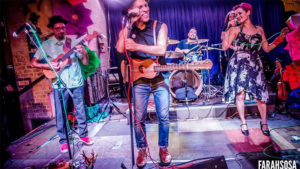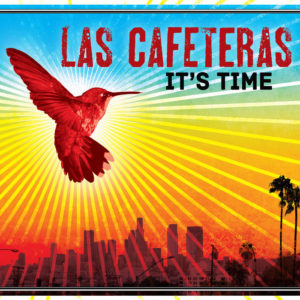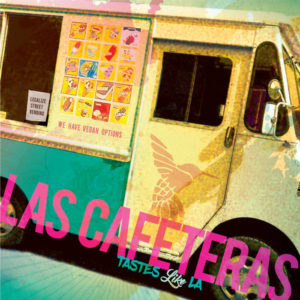Interview: Las Cafeteras – From East LA to New Zealand
What do you get if you cross a bunch of socially conscious activists with Mexican folk, hip hop, ska and African beats? You get Las Cafeteras… and their intoxicating blend of rebel music is coming to next month’s WOMAD.
Maria Hoyle spoke to to band member Hector Flores for The 13th Floor in anticipation of the group’s performance in New Plymouth for WOMAD 2019 in March. Here is her report:
Now, here’s a challenge for you… Pop on your headphones, check out the track ‘La Bamba Rebelde’ from the band Las Cafeteras – and try keeping still in your seat. Hard, eh? What’s clearly not hard, is for the campaigning combo from East LA to write anti-racist songs like La Bamba that sound not like anger, but celebration. Like fun. Songs that are a sassy, sexy, rhythmical ‘up yours’ to the political forces who try to create divisions – both metaphoric and real – between us. Songs that protest borders while building bridges through a glorious ‘get-up-from-that-chair’ mix of traditional Mexican folk, hip hop, ska, African rhythms and in-your-face lyrics.
Like the words to If I Was President – ‘my first lady would be my moms / Cause she’d slap me / At the first thought of drone strikes / And dropping bombs.’ Or in La Bamba – ‘yo no creo en fronteras, yo cruzare’ (I don’t believe in borders; I will cross) and vowing to fight like the Mexican Zapatistas. Except here it’s not guns, but guitars; not bullets but the rat-a-tat of zapateado (flamenco-like footwork) on stage.
It’s awesome, infectious, spirit-lifting stuff. So when we got the chance to catch up with band member Hector Flores on the eve of Las Cafeteras heading to this year’s WOMAD during their 2019 tour, we were pretty much salsa-ing all the way to the phone.
Hector’s roles in the band are vocals, ‘zapateado’ (based in Mexican folk tradition) and playing the ‘jarana tercera’ – a wooden eight-string guitar. Like the rest of Las Cafeteras, he is ‘Chicano’ – “someone born in the United States who honours their life in the US and their ancestry. Not just Mexican but also their indigenous ancestry,” he explains. “Everyone in the band identifies as Chicano or Chicana.”
Their sound is rooted in Son Jarocho – folk music from Veracruz on the Mexican border. Not just Las Cafeteras’ musical style but the very instruments they play, like the jarana, , requinto, quijada (donkey jawbone) and tarima (a wooden platform). They sing in English, Spanish, and Spanglish and add a remix of sounds, from rock to hip-hop.
Hector and the rest of the band met in various activist scenarios; all were involved in social justice campaigns in some form or another in East LA. Since he and other permanent band members Daniel French, his brother David Flores, Denise Carlos, Jose Cano and Leah Gallegos are all children of Mexican immigrants, did they grow up around this traditional style of music?
 “No way!” says Hector. “We didn’t hear it until our 20s. We heard it, and fell in love with it. That’s why we started playing it. It was hella Mexican but we’d never heard it before.”
“No way!” says Hector. “We didn’t hear it until our 20s. We heard it, and fell in love with it. That’s why we started playing it. It was hella Mexican but we’d never heard it before.”
This love affair began around 2006 when Hector was involved in a battle to save a community project. South Central Farm, a thriving urban farm and community garden in the industrial corridor along South Alameda, was at risk of being bulldozed for private investors, and as activists and organisers kept watch over the farm, music came into play as a rallying and uniting force.
“Every night there’d be music, poetry, dance, and there’d be this music called Son Jarocho. It’s where I met Daniel; I already knew Denise and Jose from activism.”
They were so inspired by the music that they began taking classes at the Eastside Café, the Zapatista-inspired community space. It was here they met the other students with whom, in 2008, they would form the band.
“We learned the traditional style but we wanted to do something different. The music is folk, traditional Mexican. But we’re Chicanos, we’re from LA as well. So we mixed in a lot of what we grew up with – hip hop, cumbia, ska – we wanted to mix our worlds with the Mexican folk world. That’s what Las Cafeteras is today. It’s like if Manu Chao and Lila Downs had a baby, that’s us,” laughs Hector. “Or you could say we’re a Chicano version of Gogol Bordello.”
Watch Las Cafeteras play – live they’re said to be ‘magnetic’ – and you’ll see smiles, laughter, the mesmerising zapateado… even juggling, in one video – and yet they’re singing about women’s rights, and free education, and racism, and the treatment of the undocumented. So is the celebratory style just what they do naturally, or do they strive to achieve it as a powerful way to get the message across?
“It’s both. A lot of us were organisers and activists. We understood that we did a lot of work but we never really celebrated our work. It was always campaign to campaign. Our work for justice didn’t always have the joy we felt it should have. It was very intentional that although we are talking about serious things we have to be grateful that we made it to this point. No matter how many bans there are, and laws, they can’t keep you from singing. They can’t keep you from dancing. Those are innate things we’ve been doing as a people for thousands of years. You can’t have a movement without movement.”
Because you lose sight of what you’re fighting for? Yes, says Hector, but also “If you’re not grateful, you become hateful. Music is our tool for unity and celebration. That’s the goal. If you can get people with different beliefs, values and ideas about the world dancing on the same dance floor together, that’s a good start.”
Music is always in the vanguard of movements for change, he says – from the civil rights music of the South to anti-apartheid. Or the Chicano movement.
“I imagine too with Maori people. Every place has their song… because it is the thing that connects us more than anything – our song, our movement, our culture– to who we were in the past and who we need to be in the future.”
Las Cafeteras have said that while they are champions for change, they don’t want to be dubbed ‘political’, preferring the term ‘storytellers’. Why is that?
 “I don’t want anybody to judge me before they’ve met me, before they’ve heard me, before they’ve danced with me, before they’ve listened to me. So if you introduce me to someone and go ‘hey, this is Hector, he’s really political’, all of a sudden they’re guarded, thinking ‘what if his politics are different to mine?’ But if you say ‘here’s my friend, he’s a storyteller’, it’s like ‘I have stories, you have stories’, we all have stories, we’re on the same plane. With politics there’s a hierarchy, and imbalance of status. There are stereotypes. We don’t want nothing with that. I want to meet you and break bread and see you as an equal. We want to eliminate anything that will cause you to think you are different. Politics does that. Stories don’t. We just want to connect. That’s it, you know?”
“I don’t want anybody to judge me before they’ve met me, before they’ve heard me, before they’ve danced with me, before they’ve listened to me. So if you introduce me to someone and go ‘hey, this is Hector, he’s really political’, all of a sudden they’re guarded, thinking ‘what if his politics are different to mine?’ But if you say ‘here’s my friend, he’s a storyteller’, it’s like ‘I have stories, you have stories’, we all have stories, we’re on the same plane. With politics there’s a hierarchy, and imbalance of status. There are stereotypes. We don’t want nothing with that. I want to meet you and break bread and see you as an equal. We want to eliminate anything that will cause you to think you are different. Politics does that. Stories don’t. We just want to connect. That’s it, you know?”
So, the band has been together just over 10 years. That’s a long time for such a bunch of passionate activists to stick around one another. What do they do if there’s conflict? How is it resolved?
“We operate in a democratic fashion. It takes so long, you know, but it’s how we were formed. If you ask any Cafetera who is the leader, nobody will tell you because we don’t have one. We don’t have a lead singer, we don’t have a lead band member. Everybody is the leader, everybody is a student. Everyone is a teacher. Every decision is made democratically. If it’s not unanimous we vote for a majority. It’s difficult. So I’d say the way we have survived is a therapist!” He lets out a big laugh, and I laugh too. Wait… no, he’s serious.
“It’s something we’ve been practising over the last two years. We felt it was really important. Even in a democratic group as ourselves who believe in justice, love and freedom there has to be facilitated conversations when there are so many leaders in a group. It’s a real thing!”
As well as the regular six members, at WOMAD Las Cafeteras will include Jorge Mijangos as a ‘guest player’; even though he’s played regularly with them for three years. Jorge is an accomplished luthier – maker of string instruments; one of only three in the US, says Hector – who makes the band’s wooden guitars.
 Las Cafeteras have two albums – Tastes Like LA, and It’s Time – to their name, they’ve played to crowds of up to 10,000, performed with bands such as Mexican icons Caifanes, Lila Downs, Colombian superstar Juanes, Los Angeles legends Ozomatli, folk/indie favorites Edward Sharpe and the Magnetic Zeros. And La Bamba Rebelde became a theme song for the telenovela ‘Bajo El Mismo Cielo’ on Telemundo. That’s quite a tally to date. Any particular highlights?
Las Cafeteras have two albums – Tastes Like LA, and It’s Time – to their name, they’ve played to crowds of up to 10,000, performed with bands such as Mexican icons Caifanes, Lila Downs, Colombian superstar Juanes, Los Angeles legends Ozomatli, folk/indie favorites Edward Sharpe and the Magnetic Zeros. And La Bamba Rebelde became a theme song for the telenovela ‘Bajo El Mismo Cielo’ on Telemundo. That’s quite a tally to date. Any particular highlights?
“We played with the Los Angeles Philharmonic Orchestra, who are considered one of the best in the world. To have this orchestra play music that we created in our living room, it’s beyond words. When we went to Europe, we didn’t know how people were going to take our music – Mexican folk mixed with hip hop, ska with our message of unity, in Spanish and English… but it was like we were serving tamales. People were just eating it up! It was dope. It’s like you know, you give someone a taco and they’re gonna eat it because it’s delicious. That’s how we feel about our music.”
And you know what, says Hector? It doesn’t even matter if no one understands the lyrics.
“Not everyone speaks Spanish but everyone speaks love. Everyone speaks joy. If that’s what you’re serving, people know what that is. That’s what we feel most proud about. You don’t have to understand our lyrics to know what we’re talking about. Because of the energy, the music does a lot of the talking.”
But one form of communication is important to Hector, and the other band members. He will be using sign language at WOMAD, a regular part of their performance.
“My mum is one of 14, and six of her brothers and sisters are deaf. I grew up in a deaf family, with a deaf community. I feel like it’s such a beautiful culture. Sometimes the most beautiful sound is the one you didn’t hear. As much as I love music I understand that beauty can be created in silence. That’s why we incorporate signing. My first lesson in understanding privilege was understanding that as a hearing person the world, at least now, is not made for deaf people.”
It’s yet another beautiful layer to what promises to be an exhilarating performance from a bunch of Chicanos on a mission to unite and rule. Give me their border-busting joy for life over the sad politics of wall-building any day.
Maria Hoyle
Click here for tickets and set times for Las Cafeteras at WOMAD NZ 2019